This post is also available in:
 Français
Français  Español
Español  Italiano
Italiano
Story of the Passion and death of Jesus on the Cross.
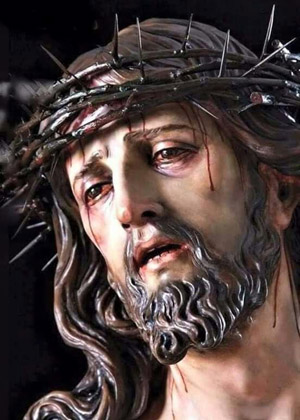
Reading 1.
Jesus had announced several times to His apostles that one day His enemies would arrest Him and inflict the most cruel torments on Him. They would judge Him unjustly and then condemn Him to death. Jesus told His apostles that He wanted all these sufferings and even death to show us how much He loved us! It is through His passion and death that Jesus redeemed us and opened the gates of Heaven, closed by sin.
Jesus’ triumphal entry into Jerusalem.
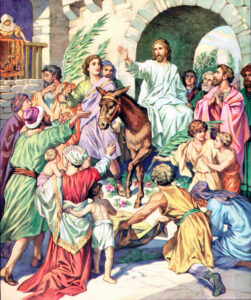
One day, Jesus went with His apostles to Jerusalem. When He arrived at the Mount of Olives, He said to two of His disciples:
“Go to Betphage, and there you will find a donkey bound and a colt with her. Untie her and bring them both. If the owner asks you for an explanation, all you have to do is say, ‘The Lord needs them.’”
Everything happened as Jesus had foretold. The donkey owner, hearing that it was for Jesus, willingly lends his animals.
Our Lord Jesus Christ mounts the colt and enters the city of Jerusalem. Many people follow Him and acclaim Him as their king. Branches are cut from the trees and placed in His path. The children run around the procession and wave palm branches, shouting their joy. It is this memory that is celebrated on Palm Sunday.
As Jesus approaches the city, He looks at Jerusalem and weeps over it, saying, “The days will come when the enemies will make trenches all around you, attack you, kill your inhabitants and destroy you.” Jesus grieves immensely as He sees the wicked stubbornly persisting in their sins.
The enemies of Jesus.
The chief priests were powerful and evil men who were always attacking Jesus. They pursue Him everywhere and seek to deceive Him in order to kill Him. They should have known that Jesus came from God, for many miracles have already proved it. But they persist in their evil purpose because their hearts are filled with pride and wickedness.
Jesus’ last meal with His apostles.
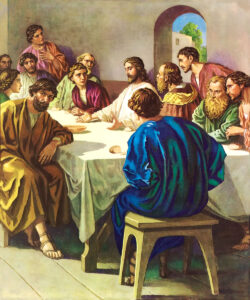
The hour of the Passion that Jesus has announced so many times is approaching…
On Holy Thursday, Jesus comes with His apostles to a large room, called the Cenacle, which is all decorated for the Passover meal. On that day, a special dinner was to be held in memory of the deliverance of the Hebrews from their captivity in Egypt.
When they sit down to eat, the apostles argue, as they so often do, about who among them will take the place of honor next to Our Lord in His kingdom.
Jesus washes the feet of His apostles.
Then, to teach them a lesson in humility, Jesus took off His cloak, took a towel, poured water into a basin, and began to wash the feet of His disciples.
Confused, Peter wants to decline, but Our Lord orders him to let Him do so, then He says:
“I am your Master and your Lord, but I wanted to give you an example, so that you would treat one another with humility and charity”.
Jesus announces that one of His disciples will soon betray Him.
During the meal, Jesus suddenly says, “You are pure… but not all of you.”
And He adds: “Truly, one of you will betray Me”.
The apostles are very saddened to hear these dreadful words. They begin to say, one after the other: “Lord, is it me?”
“One of those who eat with Me will betray Me,” Jesus repeats. “But woe to him! It would have been better for him if he had not come into the world”.
Judas, the traitor, also asks with the most shameful hypocrisy: “Is it I, Master, who will betray You?”
And Jesus answers softly, “You have said so.”
Then saint John, who is near Jesus, leans towards Him and asks Him who the traitor is.
Our Lord answers: “It is the one to whom I am going to offer a piece of soaked bread”. He takes some bread, dips it and offers it to Judas. Almost immediately, he leaves the room to go and accomplish his diabolical plan.
Reading 2.
Jesus gives Himself to us in the Eucharist.
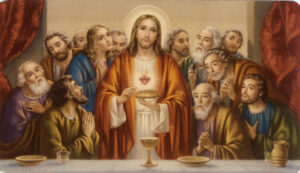
At the end of the meal, Jesus takes some bread, blesses it, breaks it and gives it to His apostles, saying: “Take and eat, for this is My body”.
In the same way, He took a cup and gave it to them, saying, “Drink from it all. This is the cup of My blood shed for you and for many for the forgiveness of sins. What I have just done, you will do again, in remembrance of My actions”.
It is at this moment that Jesus instituted the Eucharist: it is the great mystery of Jesus who becomes bread to nourish our soul. He loves us so much that He does not want to abandon us when He leaves the earth. For more than 2000 years, He dwells with us in His tabernacle. At the same time, Jesus consecrates His first priests. The priest continues the work of Jesus Christ on earth.
Jesus repeatedly says to His disciples: “Love one another as I have loved you”.
Jesus tells Peter that he will deny Him and abandon Him.
During the meal, Jesus addresses Peter in a special way: “I have prayed for you, that your faith may not fail.”
Peter exclaims: “Even if all would forsake You, I will not! Jesus, I would give my life for You! I will follow You into prison and even to death!”
And Jesus answers, “Truly, I say to you, this very night, before the rooster has crowed twice, you will have denied Me three times.”
But Peter repeats more loudly, “No, no, I will never leave You. I will not deny You.” And the others say the same.
After singing a hymn, Jesus leaves the Upper Room to go with the apostles to the Garden of Olives.
The supreme lesson of Jesus.
Seeing vines along the road, Jesus said to His apostles: “I am the true vine and you are the branches”. That is, you live by My life, as the branches live by the sap they receive from the trunk.
Jesus adds: “He who remains united to Me bears much fruit, but without Me you can do nothing”.
Then Our Lord prays to His Father for His apostles and for us, saying: “Father, protect them, so that they may remain united and become one, as You and I are one. As You sent Me into the world, so do I send them.”
Agony of Jesus in the Garden of Gethsemane.
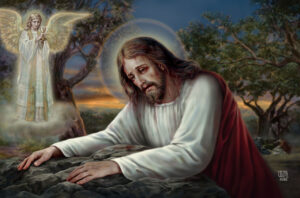
Followed by the Eleven, for Judas had disappeared, Jesus arrives at the Garden of Olives. It is a quiet area where He often comes to pray during the night. That evening, Jesus leaves eight of His apostles at the entrance and takes only Peter, James and John with Him.
Then He begins to feel an immense sadness and a mortal anguish. He says to His three friends: “My soul is sorrowful to the point of death! Stay here and watch with Me.”
The garden is bathed in moonlight, and Our Lord comes forward in the shade of the olive trees. He kneels down and prays thus: “My God, if it is possible, let this chalice depart from Me… However, Thy will be done, and not Mine”.
At this moment, He clearly sees before Him, on the one hand, sinners with their crimes, on the other hand, the perhaps useless sufferings that await Him, because many wicked people will refuse His grace.
At this thought, He falls into such a dejection that the extreme suffering makes Him sweat drops of blood. Three times He approaches His apostles, hoping to find comfort from them. But, poor Jesus! He finds them asleep!
He wakes them up and says to Peter with kindness: “So, you were not able to stay with Me for an hour? Watch and pray, so that you will not succumb to temptation.”
He goes away again and repeats the same prayer, “My Father, if it is possible, let this chalice be removed from Me!”
Then an angel comes from heaven to console Him, showing Him that His sufferings will not be lost for everyone. Certainly, at that moment, Jesus saw in advance the generous children who, by their sacrifices, their acts of obedience, their prayers well done, will also seek to console the good Jesus who loves them so much.
Reading 3.
The betrayal of Judas. Jesus surrenders Himself to His enemies without resistance.
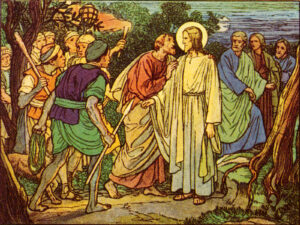
Around midnight, lights appear behind the dark trees. Jesus returns to His disciples and finds them sleeping again: “Get up,” He says to them, “for the one who is to betray Me is coming.”
Indeed, Roman soldiers and Jews, armed with swords and sticks, enter the garden, led by a man whose evil glare spies in all directions: it is Judas. He had said to his companions: “The one I will embrace is Him; seize Him”.
And immediately, approaching Jesus, he says to Him: “Hail, Master”. And he embraces Him. Jesus says to him: “My friend, why did you come? Judas, you betray Me with a kiss!”
Then Jesus goes before the soldiers and says to them, “Who are you looking for?”
They answer Him, “Jesus of Nazareth. Jesus said to them, “It is I.”
As soon as He said this, Judas and the soldiers stepped back and fell face down before Him. He asks them again, “Who are you looking for?” They answer, “Jesus of Nazareth.”
Jesus says again: “I have already told you that it was Me. So if you are looking for Me, let these go.”
And He points to His disciples, forbidding the soldiers to do them any harm. Then the soldiers jumped on Him to secure Him.
Jesus performs a miracle to heal a wounded enemy.
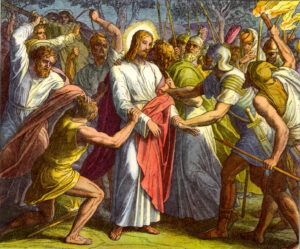
“Lord, shall we strike with the sword?” cries His dear Peter. And without waiting for an answer, He draws His sword, strikes the high priest’s servant and cuts off his right ear.
But Jesus says to Peter, “Put your sword back in its sheath and be still, for so it must be.” And having touched the man’s ear, Jesus healed him.
“You have come to arrest Me as a robber,” Jesus said to the soldiers and the Jews. “And yet, I was among you every day in the Temple and you did not arrest Me. If you arrest Me today, it is because I am so willing and to fulfill what has been foretold about Me by the prophets.”
And Jesus lets Himself be chained and led away by these wretches.
The apostles, seeing what is going on, are afraid of being arrested, too. Taking advantage of the fact that the soldiers are all gathered around Jesus, they cowardly abandon Him and flee in terror.
At the palace of the high priest.
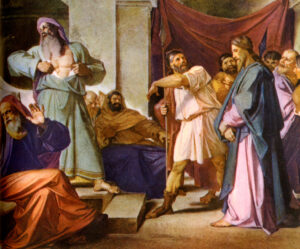
A great commotion occurs at the high priest’s palace when the soldiers bring the divine Prisoner there. At that time, the Jews were under Roman occupation and Caiaphas was high priest. Annas, his father-in-law, had been high priest before him. He is a treacherous and cruel old man, one of the main authors of the plot against our Lord. When Jesus is dragged into his presence, he takes great pleasure in seeing Him in chains.
Annas asks the Savior about His disciples and His doctrine, hoping to find in His answers some words capable of condemning Him.
But Jesus answered that He has always taught publicly in the Temple, and that all they had to do was ask those who heard Him.
At these words, one of Annas’ servants, seeking to please his master, slaps Jesus, and shouts, “Is this how You answer the high priest?”
“If I have spoken wrongly,” replies Jesus with His unalterable gentleness, “show what I have said wrongly; but if I have spoken rightly, why do you strike Me?”
But they come to warn Annas that the Sanhedrin is assembled and awaits the prisoner to judge Him. The Sanhedrin was the great council of the Jews that judged all important judicial matters. It had the right to condemn to death, but could not execute its sentences without the authorization of the Roman governor.
Caiaphas, the president, is sitting on a platform when Our Lord is brought in by the guards to be interrogated. But it is impossible to find in the holy life of Jesus the slightest appearance of an act that merits the death sentence. False witnesses were brought in. Their statements do not agree.
Jesus hears all this and remains silent.
In the end, Caiaphas, moved with anger, rises and cries out, “Do You answer nothing to what these men are testifying against You?”
But Jesus still remains silent.
Then Caiaphas questions Him again, “If You are the Son of God, tell us.”
“I am,” Jesus replies, “and from now on the Son of Man will sit at the right hand of Almighty God, and one day He will come on the clouds of Heaven to judge you.”
The high priest, at the height of his indignation, tears his clothes.
“He has blasphemed,” he cries, “what do we need of testimony! Behold, you have just heard a blasphemy from His own mouth. What do you think of it?”
And all respond with a shout, “He deserves death!”
Reading 4.
The triple denial of Peter.
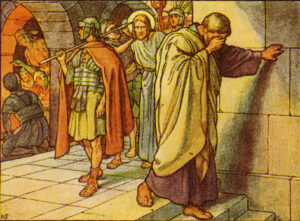
While Jesus is before the Sanhedrin, what are the apostles doing?
Most of them have fled, but Peter and John, after a moment’s hesitation, have retraced their steps and, from a distance, are following the procession of soldiers who have arrested their Master.
Saint John, who knew the janitor of Annas’ house, was able to enter with Peter. Then, no doubt wanting to warn the Blessed Virgin of what was happening, he left, leaving Peter all alone in the middle of the courtyard.
It was cold. The servants and soldiers waited for the end of the trial, warming themselves around a brazier.
Peter approached timidly. In the light of the fire, his face lit up and the concierge, a little worried about having let someone who was not from the house enter, could examine him at leisure. Suddenly she said to him, “You too were with Jesus of Galilee.”
Peter, trembling at being recognized, denied it in front of everyone, saying, “I don’t know what you’re saying.”
And in the courtyard, a rooster began to crow.
Soon after, another servant girl saw Peter and said to the others, “This one was also with Jesus of Nazareth.
Peter again denies it, swearing, “I do not know this man.”
When the servants heard that a Galilean had dared to mingle with their group, they approached Peter and said to him, “Surely you are one of these people, for you have an accent that give you away.”
In fact, the Galileans had a different pronunciation from those of the other regions.
The poor disciple, more and more terrified, begins to shout, even to swear that he does not know this man of whom they speak.
At the same moment, the cock crows and Jesus crosses the courtyard, chained, suffering cruelly under the blows of the executioners, but suffering even more painfully in His Heart from the triple denial of His apostle Peter.
Nevertheless, His gaze expresses more pity than indignation for this unfortunate man who, in following Him to this point, has nevertheless exposed himself to danger, for love of Him.
Jesus turns to the apostle and His gaze meets his own.
Peter then remembers what his Master told him, “Before the cock crows twice, you will have denied Me three times.”
He goes out and weeps bitterly for his great sin.
The despair of Judas the traitor.
When Judas learns that Jesus is condemned to death, he understands the full horror of his crime. So he decides to give back to the Jews the thirty coins he received as a price for his betrayal. He goes to them and says, “I have sinned by delivering the blood of the Righteous One.” And he hands them the money.
But the others answer him wickedly: “What do we care? It’s your business!”
Desperate, he throws his money into the Temple and goes to hang himself from a tree. He would have done better to go and hang himself around Jesus’ neck and ask Him for forgiveness. Jesus would have forgiven him, cleansed his soul and granted him salvation.
Jesus at Pilate’s tribunal.
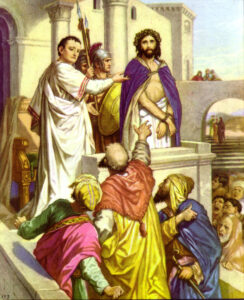
The Jews bring Jesus before Pilate, the Roman Governor, to have Him sentenced to death.
Pilate soon realizes that Jesus is innocent, but he doesn’t know how to get rid of the screaming crowd that has invaded his palace.
“Are You the King of the Jews?” he, too, asks Jesus.
“Yes, I am King,” answers Our Lord, “but My Kingdom is not of this world. I have come into this world to bear witness to the Truth.”
“What do You have to say to the charges brought against You?” questions Pilate again.
But Jesus remains silent.
Then Pilate, addressing the crowd, says, “I see nothing in this prisoner that deserves death.” The Jews shout louder and louder, “He is revolutionizing the people with His teaching. He started in Galilee and has come all the way here.”
Thus learning that Jesus is a Galilean, Pilate, to get rid of the matter, sends Him back to King Herod, who is in Jerusalem precisely at that moment.
Jesus is ridiculed by a perverse king.
Herod shows sadistic joy at the sight of Jesus because he hopes to be amused by seeing Him perform some miracle.
So he questions Him, but Jesus answers nothing to this treacherous prince who had put Saint John the Baptist to death.
Herod, offended by Jesus’ silence, took revenge by having Him dressed in the large white robe of fools. The people of the palace ridicule Jesus and Herod sends Him back to Pilate.
And Jesus accepts this humiliation to atone for the pride of humanity, including our own.
Reading 5.
Jesus is taken back to Pilate. The worst of the criminals is preferred to Him.
When He leaves Herod’s palace, Jesus is greeted by the coarse mockery of the crowd that escorts Him to Pontius Pilate, shouting and insulting Him.
The governor knows that his duty is to deliver Jesus, but he is weak and cowardly and fears above all that he may lose the favor of the Roman emperor if he does not succeed in calming the agitation of the Jews.
Now, at the time of the Passover, it was customary to free a prisoner designated by the people. In prison at that time was a famous criminal named Barrabas. Thinking he had found a way to free Jesus, Pilate said to the Jews, “Which of the two do you want me to release: Jesus or Barrabas?”
Just then, his wife Claudia sends a messenger to tell him to release Jesus, whom she reveres as a righteous man.
Taking advantage of this interruption, the leaders of the Jews persuaded the crowd to ask for the release of Barrabas instead; and when, for the second time, the governor asked, “Whom do you want me to release to you, Barrabas or Jesus?” a great clamor resounded, “Release Barrabas!”
“But then,” said Pilate, “what shall I do with Jesus whom you call the King of the Jews?”
All shouted even louder, “Let Him be crucified!”
“But what evil has He done? I find nothing in Him that deserves death. I am willing to have Him punished, and then I will let Him go.”
Jesus is cruelly scourged.
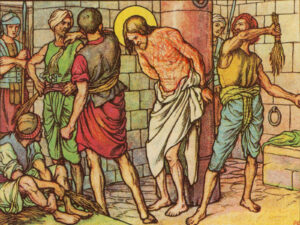
Out of cowardice, Pilate has Jesus scourged, hoping to appease the crowd.
The soldiers brutally seize Jesus and lead Him into an inner courtyard. There they tied His hands to a column. The executioners began to beat Him mercilessly with their horrible whips made of straps with hooks and lead bullets.
Blood gushed out abundantly, pieces of skin were torn off. His poor body, all shredded, is soon nothing more than a wound.
The soldiers put a crown of thorns on Jesus’ head and mock Him.
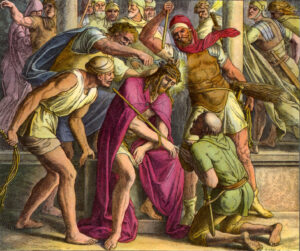
When the soldiers are tired, they untie Jesus, then, to mock Him, throw an old red woolen cloak over His shoulders. They put a reed in His hand as a scepter and a woven crown of thorns on His head. With sticks, they beat on the crown. The long thorns go into His skull, out through His eyes. The blood runs down His hair and face to the ground.
Then the soldiers parade before Him, laughing and mocking. Each one bends the knee as they pass by and says, “Hail, King of the Jews!”
For a long time they continue to beat Him and insult Him in every way.
The ungrateful crowd calls for the death of Jesus their Savior.
Finally, the soldiers bring Jesus before Pilate. The governor himself is impressed to see the sad state of the Savior. He has Jesus brought to the balcony of the palace, hoping to stir up the crowd gathered at the gates of the court.
“Here is the Man!” shouts Pilate, “I bring Him to you so that you may know that I find no cause for condemnation in Him.”
Cries of rage rise up: “Crucify Him! Crucify Him! He must die because He called Himself the Son of God!”
At these words, Pilate is even more frightened. He starts questioning Jesus again: “Where are You from?” Jesus gives him no answer.
“Don’t You say anything? Don’t You realize that I have the power to put You on the cross and the power to release You?”
“You would have no power over Me,” Jesus calmly answers, “if it had not been given to you.”
“If you have Jesus delivered,” say the Jews, “you are no friend of Caesar!”
This name of Caesar takes away from the cowardly governor what little courage he has left. He had a basin of water brought to him and washed his hands, saying, “I am innocent of the blood of this just man.”
But the crowd responds by shouting, “His blood be on us and on our children!”
Jesus is condemned to die crucified.
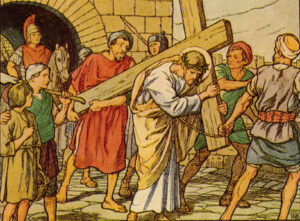
Then Pilate hands Jesus over to His furious enemies to be crucified.
The executioners loaded Him with a cross made of two large wooden planks. The condemned man has to carry it himself to the place of torture.
It is very difficult and painful for Our Lord to walk with this burden, when He is already exhausted from the scourging and crowning with thorns that He has just undergone. So He falls a first time.
Mary, the most Holy Mother of Jesus, follows Him to the top of Calvary.
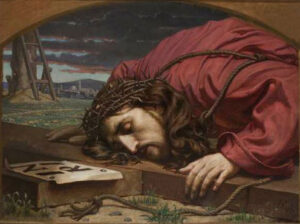
The Blessed Virgin, in great sorrow, follows the procession and, in spite of the crowd, She tries to be as close as possible to Her divine Son Jesus, in order to support Him. At a certain moment, She arrives in front of Him. The Son and the Mother do not say a word. But, what infinite pain They feel! The sorrowful look of the Virgin Mary tells Jesus that She accepts the will of God and wants to suffer with Him to help Him save our souls.
Reading 6.
Simon of Cyrene is forced to help Jesus carry the cross.
Jesus is so weak that the executioners see that He will die of exhaustion under the heavy cross before they reach the place of torture. So they stop a man passing by – a worker named Simon of Cyrene – and force him to carry the cross with our Savior.
A compassionate woman consoles Jesus.
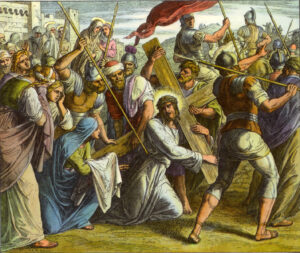
A woman who was following Jesus, weeping, managed, despite the executioners and the crowd, to get close to Him. To comfort Him, she wipes His face with a white cloth, all stained with blood, tears and mud. Her name is Veronica.
To reward her for her charity, Jesus leaves the imprint of His face on the cloth. This is known as the Holy Face.
Jesus falls under His cross. Women who love Him weep over His sad state.
A second time, Jesus falls under the weight of His cross. He gets up courageously and it is then that the women of Jerusalem, seeing Him so overwhelmed with suffering, cry out with loud moans. Jesus said to them, “Do not weep for Me, but weep rather for yourselves and your children, for behold, terrible days are coming!”
By this, the Savior wants us to understand that the great misfortune is our sins because they are the cause of His sufferings so cruel.
On the way, Jesus falls again and again, so exhausted is His strength and so heavy is the cross. Each time He weakens, the executioners strike Him brutally, until He gets up again.
And always, out of love for us, Jesus takes up His cross and goes up to Calvary.
Jesus is nailed to the cross. He dies after three hours of tremendous suffering.
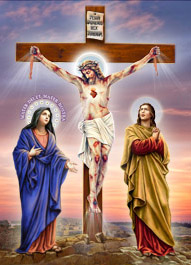
Finally the top of Calvary is reached, a mound outside the walls of Jerusalem. The executioners violently tear off the tunic of Jesus. All His wounds are opened again. It is like a second scourging.
Then the executioners brutally lay Him on the cross and drive huge nails into His hands and feet. The crucifixion is such an excruciating torture for Jesus that it cannot be measured. But, instead of complaining or taking revenge, Jesus says with His infinite meekness: “Father, forgive them, for they know not what they do”.
He remains nailed to that cross for three hours, hanging by the gaping wounds in His hands and feet and silently enduring torments that surpass anything we can imagine.
Jesus gives us His Mother and entrusts us to Her protection.
The Blessed Virgin, Saint John, Mary Magdalene and some faithful friends remained standing at the foot of the cross. Nearly dying, Jesus said to His Mother, indicating Saint John: “Here is Your son”, and to the apostle: “Here is your Mother”. Since that solemn moment, the Blessed Virgin Mary has adopted us all as Her children. She watches over us constantly. She shows us Her love and power every time we turn to Her.
The two criminals crucified with Jesus.
Two thieves were crucified with Jesus: one on His left, the other on His right. First of all, the two criminals cover Jesus with mockery and insults. While one of them, named Dismas, is soon touched by Jesus’ love, the other joins the crowd in insulting Him: “If You are the Christ, save Yourself and us with You!” But Dismas, moved by Jesus’ patience and mercy, prays to Him: “Lord, remember me when You are in Your kingdom”. And Jesus answers him: “This very day you will be with Me in Paradise”.
The last words and death of Jesus on the cross.
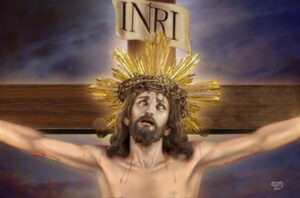
Then Jesus makes a heartbreaking appeal to God His Father: “My God, My God, why have You forsaken Me?
He says again: “I am thirsty”. And one of the soldiers hands Him, with his spear, a sponge soaked in vinegar. Jesus took the vinegar and said, “All is consumed”. With these words, Jesus affirms that He has perfectly realized the great mission for which He came to earth: He has accomplished our redemption.
Then He cries out with a loud voice: “Father, into Your hands I commend My soul.”
And He breathes His last.
(Let’s keep a minute of silence to tell Jesus that we regret all our sins that caused His sufferings. Let us thank Him for saving us by His death).The Heart of Jesus is pierced by a sword.
Soon after, a soldier comes and breaks the legs of the two thieves. When he gets to Jesus, he sees that He is already dead and thrusts a spear into His side. His divine Heart is pierced and drops of blood and water flow from this new wound.
Jesus is laid in a tomb.
In the evening, Joseph of Arimathea and Nicodemus, two friends of Jesus, untie Him from the cross and give His body to the Blessed Virgin.
Then they carry Him to a small cave nearby and the cave is closed by rolling a huge stone in front of the opening.
